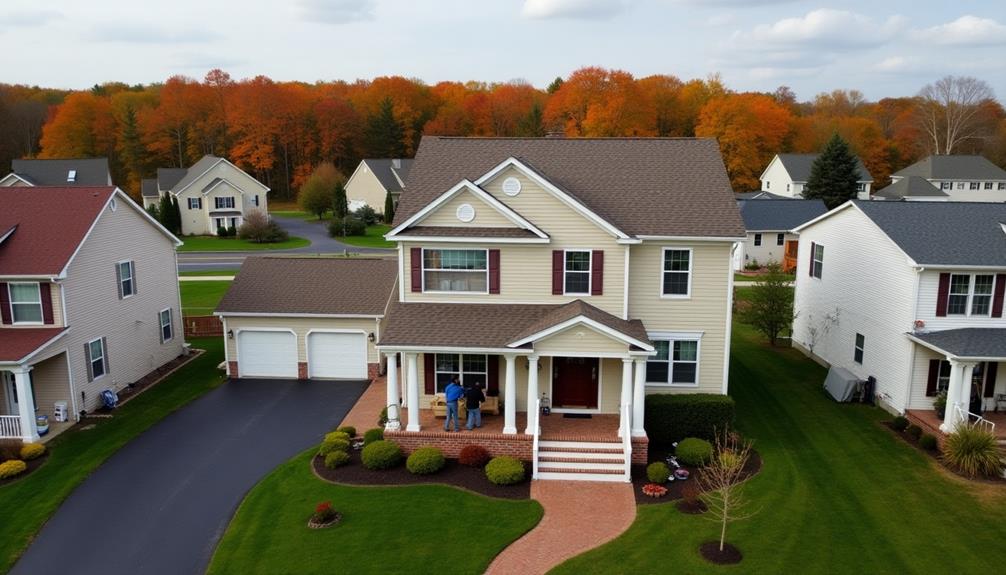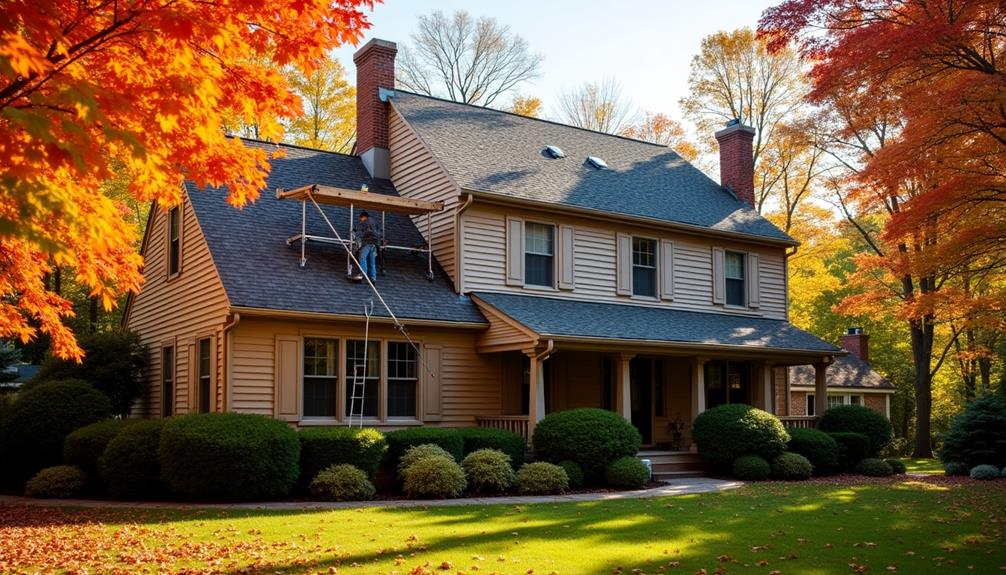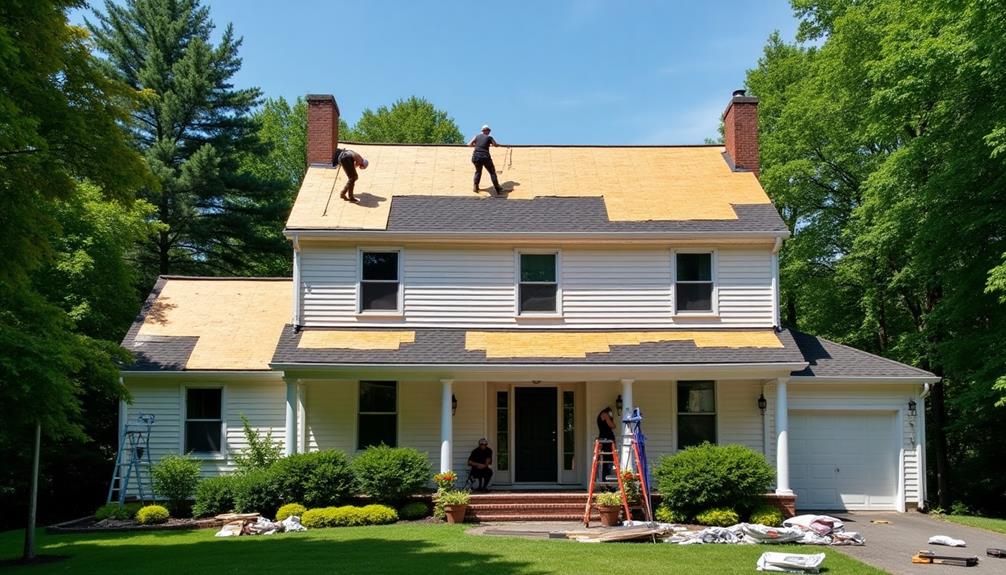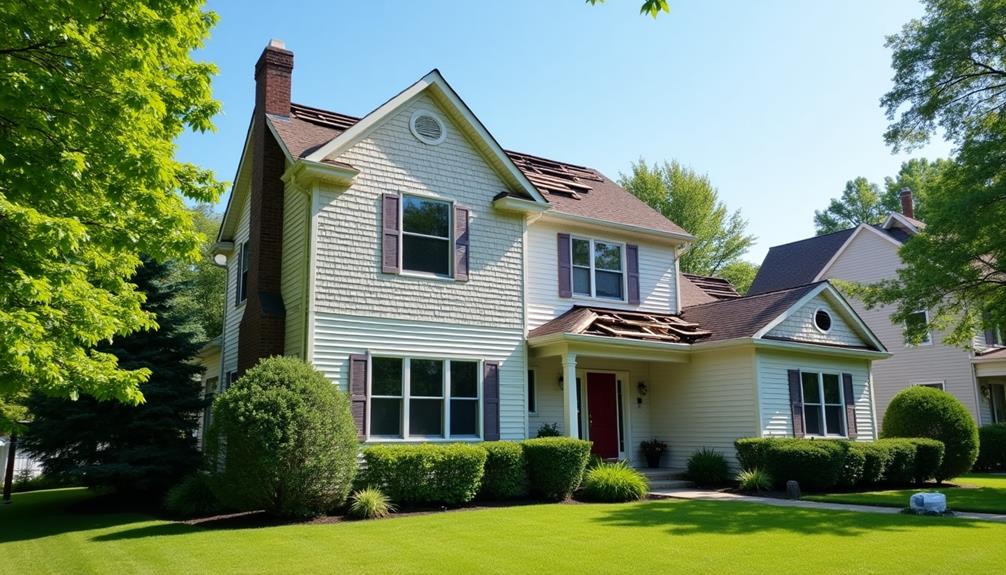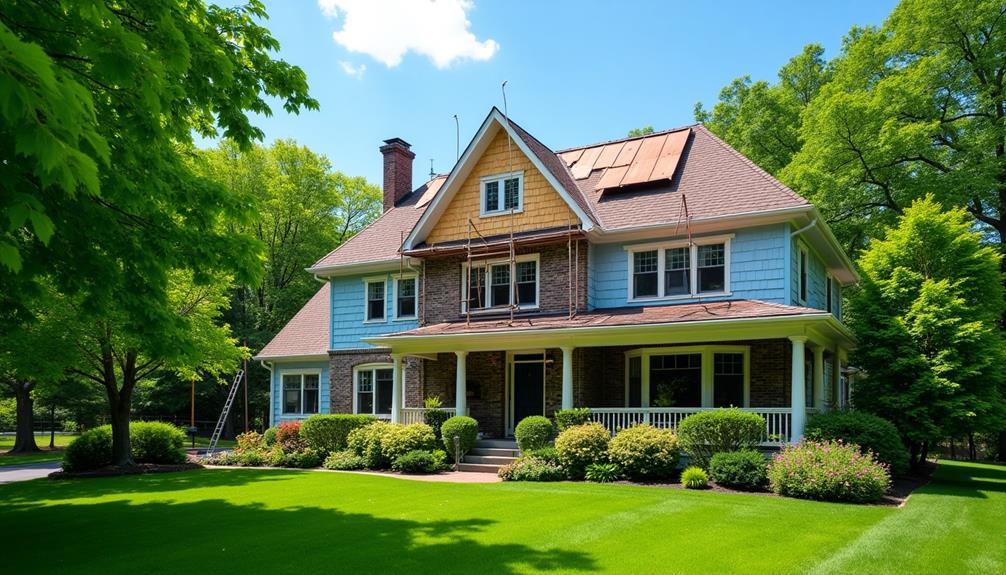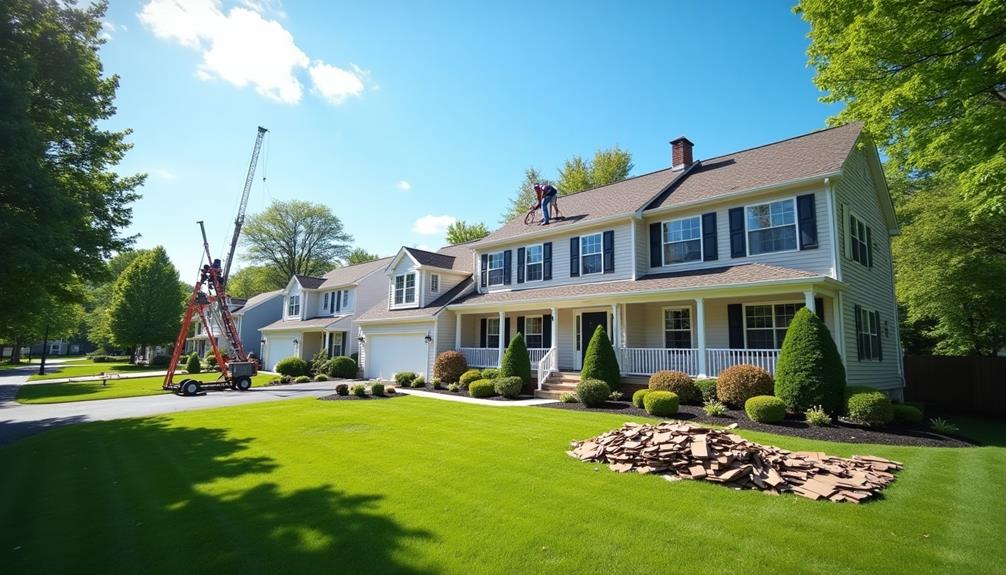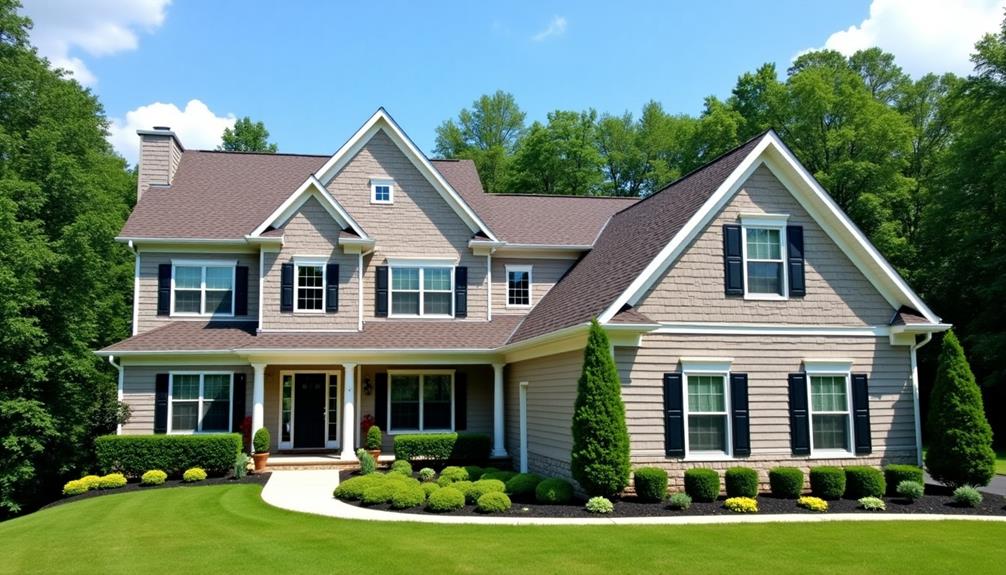If you're considering roof replacement in Middle Township, NJ, look for key signs like curling shingles, water stains, and mold growth. These indicators suggest it's time for an inspection. Modern materials, like metal or asphalt shingles, each offer unique benefits in terms of cost, durability, and energy efficiency. Additionally, ensure your project complies with local building codes to avoid future complications. Selecting a licensed contractor with references is crucial for quality assurance. Understanding your financing options, such as home improvement loans, can ease the budget considerations. For a comprehensive overview of the entire process, explore further details.
Signs You Need a Roof Replacement
When it comes to maintaining your home, recognizing the signs you need a roof replacement can save you from costly repairs down the line. One of the first indicators is shingle deterioration, which manifests as curling, cracking, or missing shingles. This not only compromises your roof's integrity but also its energy efficiency, leading to higher utility bills.
You should also conduct regular leak detection, looking for water stains on ceilings or walls. These stains could signal underlying issues requiring immediate attention. Mold growth, often a byproduct of prolonged moisture exposure, can pose health risks and indicate ventilation issues within your attic.
Additionally, consider your roof's age. Most roofing materials have a lifespan ranging from 20 to 30 years. If your roof is approaching this age, it's prudent to evaluate its condition.
Storm damage, such as missing shingles or dents in metal roofing, is another clear sign of potential failure. Finally, don't overlook curb appeal; a worn-out roof can detract from your home's exterior, impacting its overall value.
Promptly addressing these signs will ensure your home remains safe and aesthetically pleasing.
Types of Roofing Materials
Choosing the right roofing material is crucial for ensuring your home's durability and energy efficiency. You'll want to consider various types available, each with its unique benefits and characteristics. Here's a comparison of popular roofing materials:
| Roofing Material | Key Features |
|---|---|
| Asphalt Shingles | Affordable, versatile color choices, lifespan of 15-30 years, easy installation techniques. |
| Metal Roofing | Long-lasting (40-70 years), energy-efficient, eco-friendly materials, reflective options. |
| Tile Options | Durable, weather-resistant, aesthetically pleasing, can be heavy, requires sturdy support. |
| Flat Roofs | Low maintenance, modern appearance, available in synthetic alternatives, prone to pooling water. |
| Eco Friendly Materials | Sustainable options, often come with long warranties, lower energy costs. |
When choosing a material, think about your area's climate, aesthetic preferences, and the specific installation techniques involved. Each option provides different warranty options, so be sure to compare them for long-term protection. Additionally, consider lifespan comparisons, as some materials may require more frequent replacements than others.
Understanding Local Building Codes
Understanding local building codes is essential for any roofing project in Middle Township, NJ. These codes are designed to ensure that your roofing project complies with zoning regulations and safety standards specific to your area. Before beginning your roof replacement, you should familiarize yourself with the local codes enforced by the township.
Zoning regulations dictate the allowable height, materials, and design of your new roof. They also determine how close you can build to property lines and other structures. Ensuring compliance with these regulations will help you avoid potential fines or the need to make costly adjustments later.
Safety standards are another crucial aspect of building codes. They outline the minimum requirements for structural integrity, weather resistance, and fire safety. By adhering to these standards, you ensure not only the safety of your new roof but also the well-being of your home and family.
To navigate these codes effectively, consider consulting the Middle Township building department or a licensed professional. They can provide you with the necessary information and guidance to ensure your project meets all local requirements, making your roof replacement process smoother and more efficient.
Choosing the Right Contractor
When choosing a contractor for your roof replacement, you must verify their licensing and insurance to ensure compliance with local regulations and protection against liabilities.
Assessing the contractor's experience and expertise will help you gauge their ability to handle your specific roofing needs effectively.
This diligence not only safeguards your investment but also guarantees quality workmanship.
License and Insurance Verification
Before you commit to a contractor for your roof replacement in Middle Township, NJ, it's crucial to verify their license and insurance.
Start by checking the contractor credentials; a valid license indicates that they meet state requirements and are qualified to perform roofing work. You can often verify this through your state's licensing board website, ensuring that the contractor hasn't faced any disciplinary actions.
Next, focus on their liability coverage. This insurance protects you in case of accidents or damage during the project. Request proof of liability insurance and confirm that it covers any potential mishaps related to the roofing job. If the contractor lacks adequate coverage, you could be liable for injuries or damages that occur on your property.
Additionally, ask for references and past project examples to gauge their reliability and professionalism. A reputable contractor should be transparent about their credentials and willing to provide documentation.
Experience and Expertise Assessment
After verifying a contractor's license and insurance, the next step is assessing their experience and expertise.
Begin by reviewing their portfolio of completed projects. Look for a variety of roofing styles and materials that align with your needs. A contractor with extensive experience in diverse projects typically demonstrates superior project management skills, ensuring timelines and budgets are adhered to.
Next, ask for references from past clients. Contact these references to gauge satisfaction levels regarding both the quality of work and the contractor's communication skills.
Quality assurance is crucial; you want a contractor who implements rigorous inspection protocols throughout the roofing process.
Additionally, inquire about any warranties or guarantees they offer. A reputable contractor stands behind their work, providing written assurances that cover both materials and labor.
The Roof Replacement Process
Replacing a roof involves several critical steps that ensure a safe and durable installation. First, you'll want to conduct a thorough roof inspection checklist to identify any underlying issues, such as structural damage or moisture infiltration. This assessment is essential for determining the scope of the project and selecting the appropriate materials.
Once you've addressed any existing problems, you'll move on to preparing the site. This includes removing the old roofing material and inspecting the underlying structure for any necessary repairs.
Next, the installation timeline comes into play; having a clear schedule helps manage expectations and ensures the project stays on track.
With the site prepared, the new roofing material can be installed. Depending on your choice of materials—be it asphalt shingles, metal, or tile—the application process may vary. It's crucial to follow manufacturer guidelines for installation to maintain warranty coverage.
Cost Factors to Consider
When planning your roof replacement in Middle Township, NJ, it's crucial to evaluate various cost factors.
You'll need to consider the impact of material selection on overall expenses, as well as an overview of labor costs associated with the installation.
Additionally, don't overlook potential permits and regulations that may influence your budget.
Material Selection Impact
Choosing the right roofing material can significantly affect your overall costs when replacing a roof in Middle Township, NJ. The materials you select will directly influence factors such as energy efficiency, long term durability, and cost effectiveness.
For instance, metal roofs offer excellent thermal insulation and environmental sustainability, while asphalt shingles provide a budget-friendly option with moderate durability.
When considering aesthetic appeal, you'll find various color options that can enhance your home's exterior. However, keep in mind that some materials may require specialized installation techniques, which could impact labor costs.
Additionally, roofs with higher noise reduction capabilities might come at a premium but can improve your home's comfort.
Warranties also play a crucial role in your material selection. A roof with an extended warranty often reflects the manufacturer's confidence in its durability and performance.
Balancing these factors—energy efficiency, long term durability, cost effectiveness, installation techniques, and warranty coverage—will help you make an informed decision that aligns with your budget and preferences.
Ultimately, the right choice won't only meet your immediate needs but also provide lasting value and functionality for years to come.
Labor Expenses Overview
Selecting the right roofing material sets the stage for understanding labor expenses in a roof replacement project in Middle Township, NJ. Labor costs can vary significantly based on several factors, including labor market trends and wage fluctuations in your area. When budgeting for your project, it's essential to consider these elements to ensure you have a comprehensive understanding of potential expenses.
Here's a quick overview of how different factors might impact labor costs:
| Factor | Description | Impact on Costs |
|---|---|---|
| Labor Market Trends | Current demand for roofing contractors | Higher demand can increase wages |
| Wage Fluctuations | Changes in local and state wage laws | Can lead to increased hourly rates |
| Project Complexity | Difficulty of the roof design and installation | More complex projects require skilled labor |
| Seasonal Factors | Time of year and weather conditions | Off-peak seasons may lower costs |
Permits and Regulations
Navigating permits and regulations is crucial for a successful roof replacement project in Middle Township, NJ. Before you start, familiarize yourself with the local zoning requirements. These regulations dictate aspects such as building height, roof slope, and material choices, which can impact your project significantly.
You'll need to submit a permit application to the local building department, which often requires detailed drawings and specifications of your planned roof replacement. This application process can vary in complexity, depending on the scope of your project and the materials you intend to use.
Missing documentation or failing to adhere to zoning requirements can lead to delays or even fines, so it's essential to pay close attention to the details.
Additionally, consider the associated costs of obtaining these permits. Fees can vary based on the size and type of your roof, and some homeowners might opt for professional assistance to ensure compliance.
Insurance and Financing Options
When it comes to roof replacement in Middle Township, NJ, understanding your insurance and financing options is crucial for managing costs effectively.
Begin by reviewing your homeowner's insurance policy. Many policies cover roof replacement due to storm damage or other perils, but you'll need to consider your deductible. High deductibles can impact your overall out-of-pocket expenses, so it's essential to weigh the cost versus benefit of your coverage.
If your insurance doesn't cover the full cost or if you're facing a significant deductible, explore financing solutions. Various lenders offer home improvement loans specifically designed for roof replacements. These loans often have favorable interest rates and flexible repayment terms, making them an attractive option for homeowners.
Additionally, some roofing contractors may provide financing plans that allow you to pay over time instead of upfront. Always read the terms carefully and ensure you understand the total cost, including any interest and fees.
Benefits of a New Roof
Investing in a new roof can significantly enhance your home's value and curb appeal while providing essential protection against the elements. One of the key benefits is energy efficiency; modern roofing materials often reflect heat, reducing your energy bills and keeping your home comfortable.
Additionally, a new roof improves ventilation, which helps regulate indoor temperature and reduces humidity-related issues.
Enhanced aesthetics play a crucial role in increased property value. A visually appealing roof can boost your home's resale appeal, making it more attractive to potential buyers.
Improved safety is another significant benefit; upgrading to a new roof mitigates the risk of leaks and structural damage.
Noise reduction can also enhance your living experience, especially if you live in a noisy area.
Furthermore, many roofing materials come with warranty options that provide peace of mind regarding quality and durability.
You may also find that your insurance benefits improve, as a new roof can reduce your risk profile in the eyes of insurers.
Lastly, choosing environmentally friendly materials not only contributes to environmental benefits but also aligns with sustainable living practices.
Maintenance Tips for Longevity
Regular maintenance is key to extending the lifespan of your roof and ensuring it remains in optimal condition. Start with routine roof inspections at least twice a year. These inspections allow you to identify early signs of damage, which is crucial for preventive maintenance. Pay attention to any loose shingles or signs of wear.
Gutter cleaning is vital as clogged gutters can lead to water overflow, damaging your roof and siding. Ensure proper attic ventilation to prevent heat buildup and moisture accumulation, both of which can compromise your roofing materials. Effective moisture control in your attic will help reduce the risk of mold and structural damage.
Debris removal is another essential task; leaves, branches, and other materials can trap moisture and lead to deterioration. Incorporate seasonal upkeep by checking for ice dams in winter and ensuring adequate drainage during heavy rains.
Consider applying roof coatings to enhance durability and reflectivity, protecting your roof from UV damage.
Local Weather Considerations
In Middle Township, NJ, understanding local weather patterns is essential for effective roof replacement planning.
Seasonal variations can lead to specific challenges, such as heavy snowfall in winter or intense storms in summer, which may impact your roofing materials' performance.
Additionally, frequent temperature fluctuations can cause expansion and contraction, affecting the integrity of your roof over time.
Seasonal Weather Patterns
As winter approaches in Middle Township, NJ, understanding seasonal weather patterns becomes crucial for effective roof replacement planning. The local climate significantly impacts the timing and execution of your roofing project.
During the colder months, temperatures can drop below freezing, which can affect the application of roofing materials and adhesives. If you're considering a replacement, it's essential to schedule your work during milder conditions, ideally in late summer or early fall, to avoid complications.
Additionally, seasonal repairs should be prioritized before the onset of winter storms. Inspecting your roof for vulnerabilities such as loose shingles or potential leaks can save you from more extensive damage later.
Winter weather not only brings snow and ice but also increases the risk of ice dams forming, which can lead to water infiltration and structural issues.
Understanding these seasonal weather patterns helps you anticipate the climate impact on your roofing materials and installation techniques. By being proactive and planning accordingly, you can ensure that your new roof withstands the unique challenges posed by Middle Township's winter climate, protecting your home effectively for years to come.
Common Storm Impacts
Storms in Middle Township, NJ, can wreak havoc on your roof, leading to significant damage if not properly addressed.
The combination of hail damage and wind uplift can compromise your roofing materials, making them susceptible to punctures. When heavy rain follows, water intrusion can occur, resulting in leaks and costly repairs.
Additionally, ice dams may form in winter, blocking proper drainage and causing water to pool on the roof. This, along with debris accumulation from nearby trees, can exacerbate drainage issues, leading to further damage.
If a tree falls, the impact can create severe structural weaknesses or even roof punctures that require immediate attention.
Flashing failure is another concern, especially during storm events. If your flashing isn't adequately sealed, it can lead to leaks and mold growth, which poses serious health risks.
Temperature Fluctuation Effects
How do temperature fluctuations impact the integrity of your roof? In Middle Township, NJ, the range of seasonal temperatures can create significant challenges for your roofing system. As temperatures rise and fall, materials undergo thermal expansion and contraction. This constant movement can lead to stress fractures and weakened seals, ultimately compromising your roof's effectiveness.
Moreover, insulation effectiveness is crucial in mitigating the impact of these temperature changes. If your roof isn't properly insulated, extreme temperature variations can cause heat loss during winter and overheating in summer, increasing energy costs. Poor insulation can also result in moisture buildup, which may lead to mold growth and further damage to the roofing structure.
Regular inspections are essential to identify any signs of wear or damage caused by temperature fluctuations. By addressing issues promptly, you can maintain the integrity of your roof and enhance its lifespan.
When planning a roof replacement, consider materials that are resilient to temperature changes and have good thermal performance. Investing in quality insulation and roofing materials won't only protect your home but also improve energy efficiency for years to come.

